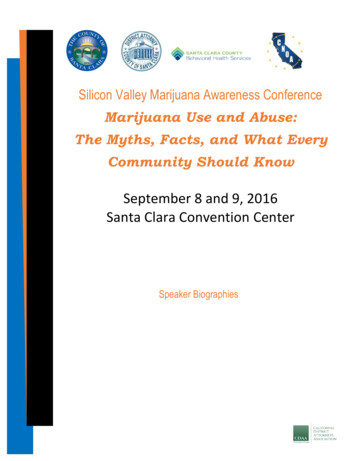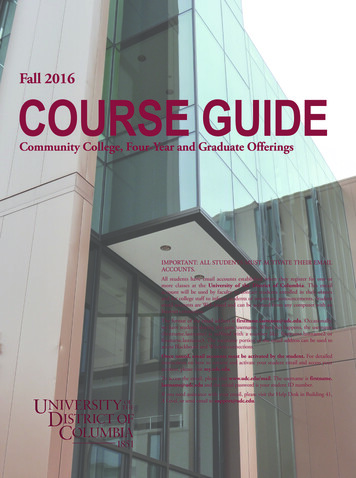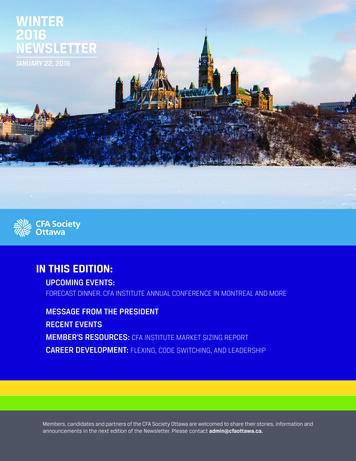
Transcription
Silicon Valley Marijuana Awareness ConferenceMarijuana Use and Abuse:The Myths, Facts, and What EveryCommunity Should KnowSeptember 8 and 9, 2016Santa Clara Convention CenterSpeaker Biographies
Scott Bauer graduated from Humboldt State University with adegree in Natural Resources in 1997. For the next eight years,Scott coordinated a Watershed Restoration Program for theCalifornia Conservation Corps in Klamath, California. In 2005, hewent to work for the Department of Fish and Wildlife, where he hasworked for the past ten years on timber harvest plan review, lakeand streambed alteration agreement permitting, and coho salmon recovery. Scott joinedthe Department of Fish and Wildlife’s newly created Watershed Enforcement Team in2014 to work full time on the environmental impacts associated with marijuana cultivation.In March 2015, Scott and his colleagues recently published a paper in the online journalPlosONE entitled, “Impacts of Surface Water Diversions for Marijuana Cultivation onAquatic Habitat in Four Northwestern California Watersheds.” When not working, Scott’stwo sons make him take them fishing as much as humanly possible.Ron Belser is a 16 year Law Enforcement Officer. He began hiscareer in 2000 as a Community Service Officer with the OrovillePolice Department. Ron graduated from the Butte Police Academyin 2002 working as a Police Officer with the Paradise PoliceDepartment. During his nine years with the Paradise PoliceDepartment Ron worked in the Detective Unit, served as a SWATand CSI Team member, and served as a Field Training Officer.Ron also completed a 4-year term with the Butte CountyInteragency Narcotics Task Force, North Division and in 2007 hewas honored with Paradise Police Departments Officer of the YearAward. Ron currently serves as an officer and oversees the Municipal Law EnforcementProgram for the Oroville Police Department. Because of Ron’s experience he began workas a consultant with the California Drug Endangered Children Training and AdvocacyCenter in 2011 and has conducted an impact study of Honey Oil Lab Cases in California,Oregon, Washington and Colorado. This study has been recognized and published bythe Drug Enforcement Administration and political figures from California and WashingtonDC.
Ralph Castro is the Associate Dean of Students and the Director of theOffice of Alcohol Policy and Education at Stanford University. Ralph has25 years of experience in the alcohol and drug field working in treatment,counseling and prevention. Ralph's area of expertise is in college healthand he focuses on developing educational initiatives, policy andpopulation level prevention programs. His work has been presented atnational conferences and published in professional journals and popularpublications. Ralph holds a Bachelor’s degree in psychology with a minorin criminal justice and a Master's degree in clinical psychology.Ravi Channell is originally from Santa Fe, New Mexico and attended Portland StateUniversity, where he earned Bachelor’s Degrees in Political Science and Arabic. Afterundergrad, he attended Middlebury’s Monterey Institute of International Studies, wherehe researched contemporary terrorism finance and extremist ideology. He graduated in2014 with a Master’s Degree in Weapons of Mass Destruction and Terrorism Studies.Prior to serving with the Oregon State Police, he worked as a private intelligencecontractor, a threat finance analyst, and, most recently, as the Senior Trainer for AntiMoney Laundering and Counter Threat Finance at Western Union in Colorado. Ravi hasdeveloped a specialization in combating illicit-markets and has a deep working knowledgeof networked strategic intelligence.Chelsey Clarke has been an intelligence analyst since 2012. She hasworked for the Advanced Technical Intelligence Center (ATIC) (Dayton,Ohio) and Lockheed Martin (Denver, Colorado). While at ATIC, Chelseywas the recipient of the Distinguished Graduate Award for specializedanalyst training. Chelsey joined the Rocky Mountain High Intensity DrugTrafficking Area (RMHIDTA) program in 2014 as a strategic intelligenceanalyst. She is a primary contributor to the annual regional RMHIDTA Threat Assessmentand The Legalization of Marijuana in Colorado: The Impact Reports. She has alsorepresented RMHIDTA in both media interviews and public presentations. Chelseygraduated from Lubbock Christian University with a degree in Criminal Justice and sheobtained her master’s degree in International Security, with concentrations in intelligenceand homeland security, from the University of Denver’s Josef Korbel School ofInternational Studies.
Tim Cromartie has been a legislative representative coveringpublic safety issues for the League of California Cities since 2013,with a heavy emphasis on the regulation of medical marijuana.Prior to that he held a variety of positions in the Legislature andstate government, including legislative representative forCalPERS Governmental Affairs, legislative director and publicsafety consultant to former state Senator Gloria Romero, and fieldrepresentative for Congresswoman Barbara Lee when sheserved in the state Senate. Mr. Cromartie is a graduate of the University of California atBerkeley and UC Hastings College of the Law.JR Denson has been working in the public health field, concentratingprimarily on issues related to alcohol, tobacco, and other drugs (ATOD),for nearly 10 years. After completing his undergraduate studies at theUniversity of Florida, he worked with Dr. Mehmet Oz’s nonprofitorganization that focused on health education and advocacy. Mr.Denson facilitated community outreach programming and addictionscounseling while pursuing a Masters of Health Promotion and PublicHealth at American University in his hometown of Washington, D.C. Hecurrently serves as a legislative fellow for the U.S. House of Representatives on CapitolHill.ShaKenya Edison is the Director of Student Services for East SideUnion High School District. She received the 2014 Association ofCalifornia School Administrators’ Pupil Personnel Administrator of theYear Award. Kenya served as a Steering Committee Member for theSanta Cruz County’s Youth Violence Prevention Taskforce, was amember of the Santa Cruz County Keeping Kids in School Taskforce,serves on Santa Clara County’s Juvenile Justice SystemsCollaborative (JJSC), and is a member of JJSC’s Prevention and Programs Workgroup.She is committed professionally and personally to improving systems through capacitybuilding and focusing on equity in policies, practices and access.
Dr. Steven Freng currently serves as the Prevention/Treatment Managerfor the Northwest High Intensity Drug Trafficking Area (NW HIDTA), aregion of fourteen counties within Washington State that has beendesignated by the White House Office of National Drug Control Policy forspecial law enforcement and chemical dependency initiatives. Theprograms under his direction focus on several areas, including support forDrug Court programs as well as substance abuse prevention projects, eachbased on active collaborations with law enforcement agencies and variously emphasizinginnovative service strategies, public education activities and neighborhood resourcedevelopment projects. Dr. Freng has acquired over 30 years of experience as a chemicaldependency professional, having worked in clinical, supervisory, administrative andmanagerial capacities in the development and delivery of chemical dependencyprevention and treatment services in the State of Washington.Sergeant Jim Gerhardt has 28 years of experience as a commissionedlaw enforcement officer with the Thornton Police Department. Jim hasbeen assigned to the North Metro Task Force for 18 years working andsupervising undercover drug investigations throughout the northernDenver-Metro Area. Jim is also the vice president of the Colorado DrugInvestigators Association and a founding member of the NationalAlliance for Drug Endangered Children.Mark Higley completed his B.S. and Master’s degrees in wildlife atHumboldt State University during the decade of the 1980’s. He hasworked the majority of his professional career as the wildlife biologist forthe Hoopa Tribe in northwestern California and has assembled a 24 yearnorthern spotted owl demographic data set. Mark has been responsiblefor the development of the Tribe’s wildlife program primarily addressingEndangered Species requirements for the Tribe’s Forest ManagementActivities. In addition to studying northern spotted owls, he has beeninvolved with forest management planning and research on fishers andblack bears. Current projects include participation in the U.S. Fish and Wildlife ServiceExperimental Barred Owl Removal Study, northern spotted owl demographic monitoring,
fisher demographic monitoring and documentation of environmental impacts fromtrespass marijuana cultivation sites.Dr. Marilyn A. Huestis recently retired as a tenured senior investigatorand Chief, Chemistry and Drug Metabolism Section, IRP, NationalInstitute on Drug Abuse, National Institutes of Health, after 23 years ofconducting controlled drug administration studies. She is an AdjunctProfessor in the Department of Epidemiology and Preventive Medicine,School of Medicine, University of Maryland Baltimore. Her researchprogram focused on discovering mechanisms of action of cannabinoidagonists and antagonists, effects of in utero drug exposure, and theneurobiology and pharmacokinetics of novel psychoactive substances,the emerging face of drug abuse. Professor Huestis’ research also explored newmedication targets for cannabis dependence, including oral tetrahydrocannabinol (THC)and Sativex, a 1:1 ratio of tetrahydrocannabinol and cannabidiol. Recently, ProfessorHuestis and colleagues documented that CB1-cannabinoid receptors are significantlydown-regulated in specific brain regions in chronic daily cannabis smokers, but thesereceptors significantly increased with sustained cannabis abstinence. Residual activecannabinoids could be quantified for up to 30 days in some chronic smokers duringsustained abstinence and, furthermore, psychomotor impairment was documented inthese same subjects for at least 21 days.Sergeant Patrick Huskey began his career with the Oregon State Police in 1998 as unarmed Cadet enforcing State parks and Fish and Wildlife laws while working on hisBachelor’s degree from Western Oregon University in Criminal Justice. After completinghis degree he was hired as a Recruit Trooper and was assigned to the Patrol Division for8 years. In 2008 he was assigned as a Detective with the HIDTA Interdiction Taskforcein Portland, Oregon where he worked until 2013 when he was promoted to Sergeant backwith the Patrol Division. In 2015 he transferred back to the Drug Enforcement Section inSalem where he assists in overseeing the programs within the Drug EnforcementSection. Sergeant Huskey supervises the Oregon State Police HIDTA team on patrolinterdictions around the state. Sergeant Huskey also oversees the Clandestine ResponseTeam and is a supervisor on the Mobile Response Team which specializes in riot andcrowd control functions.
Gordon Jackson is the Director of the Coordinated Student SupportDivision (CSSD). His Division coordinates funding processes andprovides technical assistance for a wide array of programs, whichinclude Coordinated School Health, School and Community ViolencePrevention, Tobacco-Use Prevention, Foster Youth Services, MentalHealth Services, School Climate/School Engagement, AmericanIndian Education, Educational Options, and more. Gordon completedhis undergraduate studies at the California State University, Chico andcompleted his senior year at the Universite d’Aix-Marseille in Southern France. Hereturned to Chico to complete graduate studies and student teaching at the secondarylevel in Paradise, California.Edward Liang is currently a deputy district attorney at the Santa ClaraCounty District Attorney’s Office in the Major Narcotic VendorProsecution Unit. He has prosecuted a variety of marijuana-relatedcrimes from street-level sales to medical marijuana dispensaries. Mr.Liang has been with the office since 2012, where he has served in theSouth County office, the Family Violence Unit, and the MisdemeanorTeam. Previously, he was the Prosecution and Racial Justice Fellowat the Vera Institute of Justice in New York City. He graduated fromthe University of California, Berkeley with a B.A. in Economics and received his lawdegree from the University of Virginia School of Law.Dr. Bertha Madras (the honorable) is a Professor ofPsychobiology, Harvard Medical School (HMS), at McLeanHospital, Belmont, MA. She has been an HMS faculty member for30 years. She is former Deputy Director for Demand Reduction(prevention, treatment) in the White House Office of National DrugControl Policy, Executive Office of President. Her presidentialappointment was confirmed by the U.S. Senate with unanimousconsent. During her government service, she greatly expandedScreening, Brief Interventions and Referral to Treatment (SBIRT)services in the U.S. and internationally, among others. She isprincipal/co-editor of three books, “The Cell Biology of Addiction”,
“The Effects of Drug Abuse in the Human Nervous System” and “Imaging of the HumanBrain in Health and Disease.” In December, 2015, the World Health Organization (WHO)published her commissioned monograph “Update of Cannabis and its Medical Use.” In2016, she served as one of 35 authors on the 2016 WHO report “The Health and SocialEffects of Nonmedical Cannabis use.Victor Massenkoff began his public safety career with CalFire in1976 (San Luis Obispo, San Benito/ Monterey, Santa Clara andLake/ Napa Ranger Units) with various assignments in Suppression,Emergency Command Center, Fire Prevention/Law EnforcementBureau and Arson Investigation Unit. He joined the Vallejo PoliceDepartment in 1995 with assignments to Patrol, Beat Health Unit,Investigations, Training Division and Internal Affairs Unit. Victor retired from the VallejoPolice Department and joined the Contra Costa Fire Protection District in 2008 as aninvestigator where he is currently assigned to the Fire Investigation Unit.Ms. Alice Mead received her Juris Doctor degree from University ofSanta Clara School of Law and her Masters of Law degree from Yale.She served for eleven years as staff counsel to the California MedicalAssociation (CMA), the largest state medical association in theUnited States, specializing in bioethics issues. Prior to that time, Ms.Mead was a litigation associate at the global law firm of Morrison &Forester and an Assistant Professor of Law at Arizona StateUniversity College of Law (now Sandra Day O’Connor College of Law), where she taughtconstitutional law issues. Since 1999 she has served as Vice President, U.S. ProfessionalRelations, for GW Pharmaceuticals. She focuses on domestic and international drugcontrol laws and policy issues.
David K. Mineta is President and CEO of Momentum for MentalHealth. He was appointed to the position in August 2015. From 2010to 2015, Mr. Mineta served as a Presidential appointee in the positionof Deputy Director of Demand Reduction for the Office of NationalDrug Control Policy for the White House Drug Policy Office. In 1996,he worked with Asian American Recovery Services and was namedDeputy Director in 2007. He served twice as board president for the Jefferson Union HighSchool District Board of Trustees. Mineta received a Bachelor of Arts in Political Sciencefrom the University of California, Berkeley and a Master of Social Work from San JoseState University.Sergeant Todd Miyabara has been a sheriff's deputy with the SantaClara County Office of the Sheriff since 2005. He has been assignedto the following divisions: West Valley Patrol, Headquarters Patrol,Training, Court Security, and Special Operations. He has beenassigned as a Patrol Deputy, Field Training Officer, Recruit TrainingOfficer, Academy Instructor, and Court Training Supervisor. SergeantMiyabara is currently assigned as the Supervisor for the MarijuanaEradication Team (MET) and the Assistant Team Leader for theSheriff's Emergency Response Team's (SERT) sniper unit. He has assisted or been theprimary case agent on over 150 illegal marijuana cultivation and sales investigations. Themajority of these investigations were clandestine grows in rural Santa ClaraCounty. Sergeant Miyabara received a bachelor's degree in business marketing fromSan Jose State University.Mr. Redman is the Director of Drug Demand Reduction for the HighIntensity Drug Trafficking Areas (HIDTA’s) of California, a programof the Office of the President’s, Office of National Drug Control Policy(ONDCP). Mr. Redman has been honored as an Ambassador ofPeace with the United Nations Middle East Peace Initiative and hasbeen a Delegate to the United Nations Collaboration on Global DrugPolicy, since 2008. He is the recipient of the Director’s Award forDistinguished Service from the Office of the President’s Office of National Drug ControlPolicy (ONDCP) and is the recipient of the United States President’s Call to Service
Award. In 2011 Mr. Redman was honored as the Citizen of the Year from the CaliforniaNarcotics Officers Association.Lieutenant Laurence Ryan has been a police officer with the SanJose Police Department for 26 years. During that time he hasserved or/supervised the following assignments: Robbery Unit,Homicide Unit, Gang and Assault Unit, METRO (Street CrimesSuppression Team) and VCET (Violent Crimes EnforcementTeam), Office of the Chief of Police Research and DevelopmentTeam, CRU (Convert Response Team), Narcotics Team, RegionalAutomobile Theft and Fraud Prevention Team, and Patrol Team. Lt.Ryan has a Bachelor’s Degree in Government Studies from SaintMary’s College and a Master’s Degree in Public Administration from San Jose StateUniversity. Lt. Ryan is currently serving as the lieutenant over the METRO and VCETTeams where he supervises criminal investigations into illegal gang and narcoticsactivities. The METRO and VCET teams have investigated numerous illegal marijuanacultivation and distribution operations within San Jose and neighboring communities. Lt.Ryan’s team recently effectuated arrests of more than 20 suspects after an eight monthinvestigation into a Vietnamese Organized Crime ring that was distributing millions ofdollars of marijuana nationwide. This group was also investigated for trafficking ecstasy,aggravated assault, extortion, money laundering, illegal gambling and bookmaking. Thisinvestigation is still ongoing.Dr. Kevin A. Sabet, Ph.D. is the Director of the Drug PolicyInstitute at the University of Florida, Department ofPsychiatry. With Patrick J. Kennedy, he is the co-founder of SAM(Smart Approaches to Marijuana). He is also a policy consultantto numerous domestic and international organizations. In addition,he advises several non-governmental organizations working toreduce drug abuse and its consequences, including the United Nations and other multinational organizations. Dr. Sabet’s regular blog is housed at the Huffington Post and heregularly contributes to opinion-editorial pages, including the Washington Post, New YorkTimes, and the Los Angeles Times. Two of his op-eds published since 2011 have earnedhim a “Five Best Columns” distinction by The Atlantic. He is the winner of the 2014 Nils
Bejerot Award for Global Drug Prevention, given at Stockholm City Hall by the anti-drugorganization chaired by H.M. Queen Silvia of Sweden and the John P. McGovern Awardfor Drug Prevention given by the Institute for Behavior and Health, and Robert DuPont,the founding director of the National Institute on Drug Abuse. He received his Doctorateof Philosophy and Masters of Science from Oxford University as a Marshall Scholar in2007 and 2002, respectively, and his B.A. with high honors in Political Science from theUniversity of California, Berkeley in 2001.Dr. Matthew L. Springer received his BA from the University ofCalifornia, Berkeley and his Ph.D. from Stanford University. He joinedthe UCSF faculty in 2003, where he is currently one of two nonclinicians on the faculty of the Division of Cardiology. The closejuxtaposition of his basic research background with the clinicalcardiologists in the Division has resulted in an active translationalresearch program. Dr. Springer's research interests include celltherapy and gene therapy approaches to studying cardiovascular disease, with anemphasis on heart attack treatments and how vascular function is affected by tobaccoand marijuana smoke exposure.Mr. Michael Truex has been an employee at Pacific Gas and Electric Company for 37years. He has been in the Revenue Assurance Department for twenty years where he isthe Senior Investigator for the Bay Area Team. His duties include data analysis,investigating locations, documenting findings, retroactively billing losses to violators andmaking sure locations are safe upon completion of the investigation. He has investigatedover 1000 indoor marijuana grow houses since 2009 and billed in excess of 15,000,000.00 in lost revenue associated with these investigations. Mr. Truax hastestified as an expert witness on energy theft in Alameda and Santa Clara Counties.
Alison Wassall is employed as a Criminal Intelligence Analyst for theNorthwest High Intensity Drug Trafficking Area (NW HIDTA), a regionof fourteen counties within Washington State that has been designatedby the White House Office of National Drug Control Policy for speciallaw enforcement and chemical dependency initiatives. The focus of herposition is to document impacts and consequences throughout thestate resulting from or associated with the legalization of recreationalmarijuana. The goals of her research are to provide an overview of theregulatory environment and the available body of research andliterature in order to produce a descriptive snapshot of the state in a comprehensivereport. Collaborations with various law enforcement agencies, public healthorganizations, and state and local entities have been instrumental in accomplishing thistask. Ms. Wassall’s career focus to date has entailed various aspects of the enforcementof local, state and federal laws. She has interned with the Puyallup Police Departmentand the U.S. Coast Guard Investigative Service before joining the NW HIDTA in April of2015. She received a Bachelor’s Degree in Law and Justice as well as a Bachelor’sDegree in Psychology from Central Washington University. She then received herMasters of Arts in Criminal Justice from Seattle University in June of 2015. Ms. Wassallalso participates in meetings throughout the state on marijuana policy and legislation, andhas traveled out of states to discuss early industry trends and developments withinWashington State.Ms. Yvonne West is a senior attorney with the State WaterResources Control Board Office of Enforcement in Sacramento,California. Ms. West has been with the Office of Enforcement sinceits formation in 2006 and became counsel for the CannabisRegulation and Enforcement Unit when it was first created as partof a pilot project in 2014. The pilot project was established toaddress the adverse environmental impacts resulting fromcannabis cultivation on private and State lands in NorthernCalifornia. Ms. West was instrumental in the development and implementation of the pilotproject which the legislature has subsequently authorized as a permanent, statewideprogram. Before working for the State Water Board, Ms. West was with the Sacramentolaw firm of Bartkiewicz, Kronick & Shanahan, concentrating in the areas of municipal,water, natural resources and environmental law. Ms. West earned a Juris Doctor from the
University of California, Hastings College of the Law, and a Bachelor of Arts inEnvironmental Studies from The George Washington University.Sgt. David Woolsey is currently assigned to the San Jose PoliceDepartment’s Division of Medical Marijuana Control, whichadministers the City’s regulatory program. Sgt. Woolsey startedhis law enforcement career with the Los Angeles PoliceDepartment in 1995. He worked in three divisions in Los Angeles,assigned to patrol, narcotics enforcement, and as a Field TrainingOfficer. In 2001, Sgt. Woolsey joined the San Jose PoliceDepartment. In San Jose, he gained experience in several different investigative unitsincluding the Megan’s Law Detail within the Sexual Assaults Investigations Unit,Background Investigations, and Gang Investigations. Promoted to the rank of Sergeantin 2010, he worked in patrol before being assigned to medical marijuana enforcement in2013. Sgt. Woolsey was involved in the early stages of development of the City of SanJose’s Medical Marijuana Regulatory Program. Seeing the program evolve from conceptto ordinance, and through to implementation, Sgt. Woolsey has had extensive experienceworking with medical marijuana collectives in San Jose. As part of the City’s regulatoryprogram he has reviewed, inspected or toured over two dozen medical marijuanacollective establishments, cultivation operations, and manufacturing locations onnumerous occasions. In addition to regulatory experience, Sgt. Woolsey has beeninvolved in investigating several illegal marijuana operations for a multitude of crimes, akey component to any regulatory scheme.
Community Should Know September 8 and 9, 2016 Santa Clara Convention Center . California Conservation Corps in Klamath, California. In 2005, he went to work for the Department of Fish and Wildlife, where he has . Scott and his colleagues recently published a paper in the online journal PlosONE entitled, "Impacts of Surface Water .











